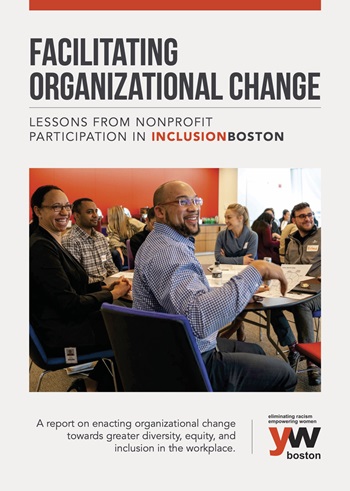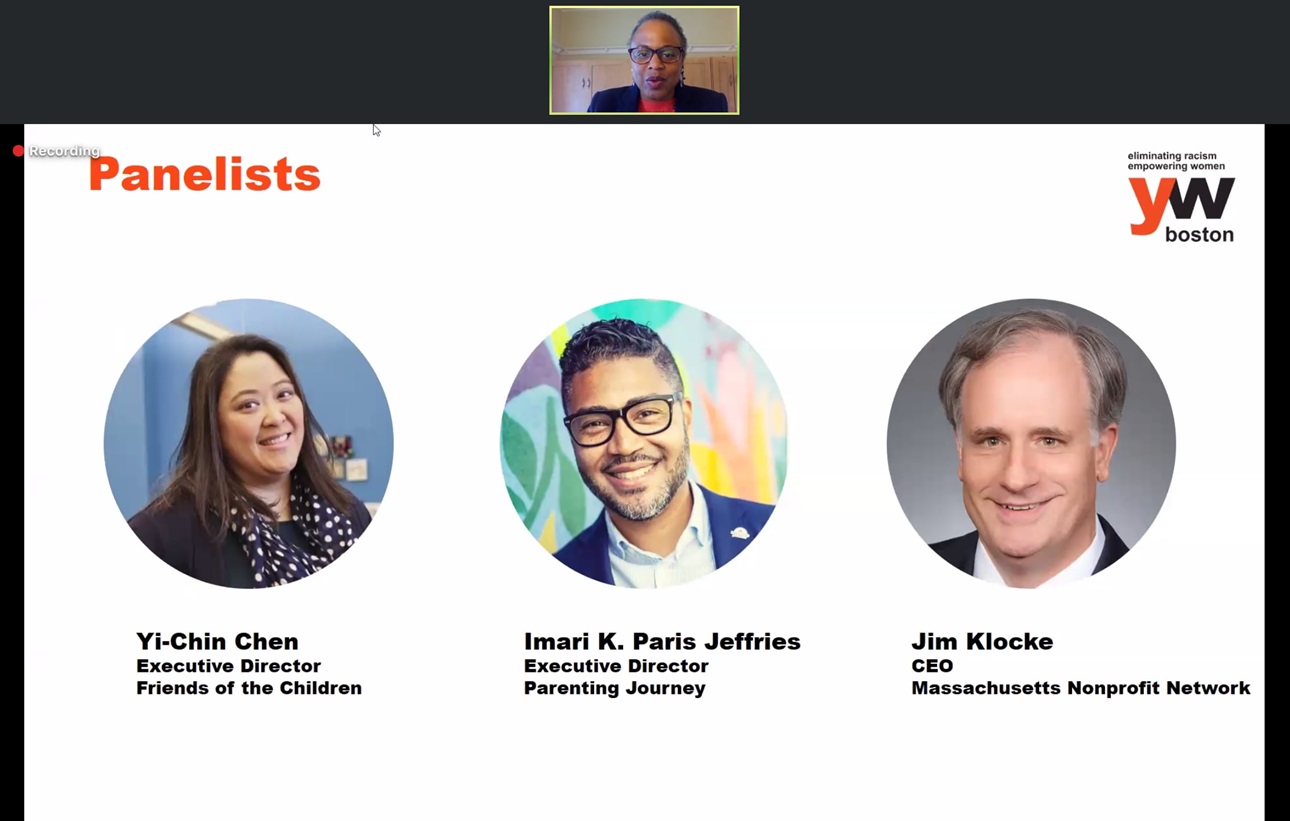Zooming in to focus on Diversity Equity and Inclusion
More than 500 joined the YW Boston and TBF to explore the challenges of strengthening DEI in the nonprofit sector
May 7, 2020
It may have been the largest forum in Boston Foundation history. More than 500 people joined us - virtually, of course - on May 7 for Advancing Racial Equity Through Organizational Change, a webinar co-hosted by the Boston Foundation and YW Boston.
After an introduction from the Foundation’s Associate VP for Programs Jennifer Aronson, the event opened with a presentation of evaluative findings from InclusionBoston, a program that brings staff and leadership from participating organizations together to have meaningful conversations about racial and ethnic identity within the workplace and to create action plans to reach their organization’s racial equity goals. Evaluation was baked into the InclusionBoston process from the beginning, explained YW Boston Vice President for Programs Kemarah Sika, as a way to make sure the program was not just feel-good work. “It’s continual growth, an everyday process,” she said, “not a checkbox. We need measurable action plans and leadership to own it to make sure it happens.” Sika shared some of their learnings, including that all InclusionBoston organizations cared about racial equity, and participants wanted to grow and to reflect the communities they serve. They all face similar challenges, however, namely staff turnover and “working lean,” which makes it hard to marry all initiatives together because of other priorities. “Diversity, equity and inclusion efforts may feel like an add-on,” Sika said, “but part of our work is to place it as lens over everything.”
YW Boston CEO Beth Chandler then moderated a discussion among nonprofit leaders who had participated in InclusionBoston:
Yi-Chin Chen, Executive Director, Friends of the Children-Boston
Imari K. Paris Jeffries, Executive Director, Parenting Journey
Jim Klocke, CEO, Massachusetts Nonprofit Network (MNN)
All confirmed Sika’s findings, that their organizations were motivated to do this work.
Jim Klocke observed: “We’d heard about [InclusionBoston] from MNN’s member organizations, and the Race to Lead work was a catalyst. There’s also the environmental aspect; the national political climate has changed for the worse, which is a backdrop to this.”
All also confirmed that the work was not easy; in fact, often uncomfortable. Said Yi-Chin Chen, “Our YW facilitators really held it together for us. To sit in our discomfort, vulnerability is required. We’re a relational organization, so one of our biggest challenges is how to have the uncomfortable conversations with people who you see every day and rely on to have your back…. How do we deal with the space in between sessions, when we have to go back to work?” Among the evaluation’s recommendations was to break with the usual norm and welcome or at least allow emotions in the workplace. “If we don’t talk about emotions in regard to racism, we won’t make progress,” Sika noted. Chen found that at Friends of the Children-Boston it helped to give people room to process their feelings, for instance with a few hours’ break after an intense session.
An element all appreciated was affinity group discussions, where people of like identities could express concerns without fear of being misunderstood or blundering in exploring new territory. Many InclusionBoston alumni organizations intend to continue with affinity groups. Chen said that for them it was one of the most powerful components of the process. “We’re trying to figure out how best to continue that. It’s a critical part of racial equity work, but affinity groups need structured facilitation.”
When Chandler asked whether InclusionBoston had helped any of the organizations manage through the crisis, all agreed it had helped them more easily see how people were experiencing the pandemic differently—both constituents and staff. Imari Paris Jeffries found it made him think even more about the future. “The pandemic and stay at home order are like a ‘walk of privilege’ sculpture. We can’t help but see who is taking a step forward and who steps back. And it makes us think, What are we going to do when we go back live? All the problems are on full display—we can’t help but bear witness to them. We’ve been asking, What do we change to do things differently? Looking at it from a public health perspective, it’s like when kids don’t go to school because of asthma, we give them an inhaler and send them off. But we have to ask why they have asthma… and it goes back to redlining in their grandparents’ day [that kept them living in less healthy housing or neighborhoods]. Almost every issue we are fighting now has its roots in racism. I hope that when we go back, people ask those questions about why inequities are there in the first place. So that we’re not competing to hand out the most inhalers. I hope people don’t want to go back to that normal.”
Aronson closed the meeting reiterating that message and why organizations’ own racial equity work is so important. “We need to close gaps that impact access to wealth and opportunity. And fixing these problems will require strong and diverse organizations to make progress in their own right.”



